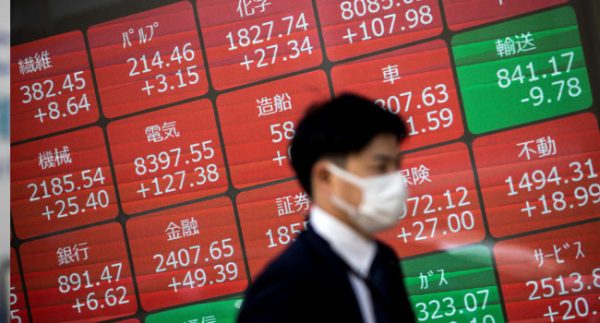
A pedestrian walks past an electronic board displaying share prices on the Tokyo Stock Exchange in Tokyo on November 4, 2020, as Asian markets react to early predictions following the US presidential election. Behrouz MEHRI / AFP
Asian stock market today slide sharply as the Bank of England (BoE) unexpectedly raised interest rates, signalling a more aggressive stance against inflation by central banks worldwide. Furthermore, Japan saw its biggest consumer inflation in seven years, increasing concerns about the impact on business profitability and consumer spending. These reasons, together with the global economic outlook, all contributed to the Asian market sell-off.
Sell-Off in Asian Markets
The sell-off in Asian markets was widespread, with key indices falling significantly. The Nikkei 225 in Japan declined 2.2%, the Hang Seng in Hong Kong fell 2.8%, and the Kospi in South Korea fell 2.7%. The technology sector was particularly hard hit, with the MSCI Asia Pacific Information Technology index losing 3.4% in a single day for the first time since March 2020.
Impact of the BoE Rate Hike
The Bank of England’s rate boost startled many investors because it was the first time the central bank hiked rates by 0.5 percentage point since 1997. This judgement emphasised the Bank of England’s concern about the possibility of runaway inflation. The rate hike is expected to have an impact on other regional central banks, with the Reserve Bank of Australia (RBA) following suit and raising rates by 0.25 percentage points, while the People’s Bank of China (PBoC) may take steps to combat growing inflation.
The Impact of Rising Inflation
Rising inflation has been a major source of concern for central banks around the world. The United States is experiencing 40-year high inflation, while major economies such as the Eurozone and the United Kingdom are also experiencing an increase. Inflationary repercussions, such as tightened household budgets and decreased business earnings, are projected to hamper economic development in the coming months.
Outlook for Asian Stocks
While the Asian market sell-off may continue in the medium term as investors evaluate economic data and central bank policies, some analysts see the dip as an opportunity to buy in Asian stocks at more reasonable values. Because of the region’s fast rising economies, the outlook for Asian stocks remains optimistic in the long term. However, as central banks tighten monetary policy, investors should brace themselves for volatility.
Aside from the variables stated above, other factors may have an impact on the prognosis for Asian equities in the future. These include the rate of Chinese economic growth, the outcome of the 2024 US presidential election, and the consequences of global wars. As a result, before making any investment decisions, investors should carefully analyse these considerations.
Overall, the recent drop in Asian markets indicates investors’ scepticism about the global economic outlook. Nonetheless, some experts see this as an opportunity to buy Asian stocks at a discount. Long-term prospects for Asian stocks remain positive, but investors should be wary of short-term volatility caused by central banks’ tightening measures.




